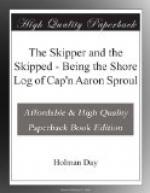“Le’s see!” said Hiram, fingering his nose, “was it real money or Confederate scrip that you let him have on your morgidge?”
“Thutty-five hunderd ain’t much on the most central piece of real estate in this village,” declared the Cap’n, in stout defence.
“It’s central, all right, but so is the stomach-ache,” remarked Hiram, calmly. “What good is that land when there ain’t been a buildin’ built in this town for fifteen years, and no call for any? As for the house, I’ll bet ye a ten-cent cigar I can go over there and push it down—and I ain’t braggin’ of my strength none, either.”
The Cap’n did not venture to defend his investment further. He stared despondently through the window at the seamed roof and weather-worn walls that looked particularly forlorn and dilapidated on that gray March day.
“I let him have money on it when the trees was leaved out, and things look different then,” he sighed.
“And I must have let him have it when I was asleep and dreamin’ that Standard Ile had died and left his money to me,” snorted the showman. “I ain’t blamin’ you, Cap, and you needn’t blame me, but the size of it is you and me has gone into partnership and bought a tavern, and didn’t know it. If they had let Parrott alone he might have wiggled out of the hole after a while.”
“It ain’t wuth a hoorah in a hen-pen if it ain’t run as a tavern,” stated the Cap’n. “I ain’t in favor of rum nor sellin’ rum, and I knew that Ferd was sellin’ a little suthin’ on the sly, but he told me he was goin’ to repair up and git in some summer boarders, and I was lettin’ him work along. There ain’t much business nor look-ahead to wimmen, is there?” he asked, sourly.
“Not when they bunch themselves in a flock and get to squawkin’,” agreed his friend.
“I don’t know what they are doin’ over there now,” averred the first selectman, “but before they set fire to it or tear the daylights out, and seein’ as how it’s our property accordin’ to present outlook, I reckon we’d better go over and put an eye on things. They prob’ly think it belongs to Ferd.”
“Not since that bean-pole with a tin badge onto it got acrost there with its mouth open,” affirmed Hiram, with decision, “and if he ain’t told ’em that we bought Ferd out and set him up in the rum business, he’s lettin’ us out easier than I figger on.”
The concerted glare of eyes that fairly assailed them when they somewhat diffidently ventured into the office of the tavern indicated that Hiram was not far off in his “figgerin’.” The embarrassed self-consciousness of Constable Nute, staring at the stained ceiling, told much. The indignant eyes of the women told more.
Mr. Parrott’s brother was a sea-captain who had sent him “stuffed” natural-history curios from all parts of the world, and Mr. Parrott had arranged a rather picturesque interior. Miss Philamese Nile, president of the W.T.W.’s, stood beneath a dusty alligator that swung from the ceiling, and Cap’n Sproul, glancing from one to the other, confessed to himself that he didn’t know which face looked the most savage.




